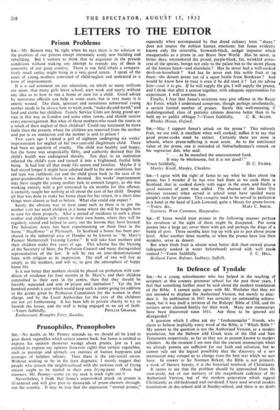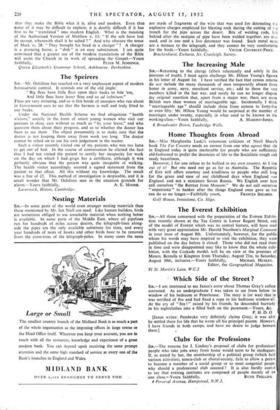In Defence of Tyndale
SIR,—As a young schoolmaster who has helped in the teaching of scripture at this country grammar school for the past three years, I feel that something further must be said about the modern translations of the Bible. I cannot quite agree with Mr. Wechsler that they are not intended to displace the Authorised Version, but merely to eluci- date it. Its publication in 1611 was certainly an outstanding achieve- ment, but it was itself a revision of the Bishops' Bible of 1568, and the revisers never claimed finality for their work. Many new manuscripts - have been discovered since 1611. Me these to be ignored and disregarded ?
A question which I often ask my " fundamentalist " friends, who claim to believe implicitly every word of the Bible, is "Which Bible ? " My answer to the question is not the Authorised' Version, or a modern translation, but the Hebrew a!fd Greek texts of the Old and New Testaments respectively, as far as theyare at present known to modern scholars. At the moment I am sure that the ancient manuscripts which we already possess are sufficient for our faith and salvation, but we cannot rule out the logical possibility that the discovery of a new manuscript may compel us to change even the best text which we now have. In answer to Sir Norman Birkett, the Bible is not primarily a work of literary beauty; it is the historical textbook of Christianity.
It seems to me that the problem should be approached from the view-point, not of our memory of the magnificent cadences of the Authorised. Version, but of the modern generation which regards Christianity as old-fashioned and out-dated. I have used several modern translations in day-school and in Sunday-school, and there is no doubt
that they make the Bible what it is, alive and modern. Even thus some of it may be difficult to explain; it is doubly difficult if it has first to be " translated " into modern English. What is the meaning of the Authorised Version of Matthew v, 13: "If the salt have lost its savour, wherewith shall it be salted ? " And why obscure the sense of Mark vi, 28: "They brought his head in a charger " ? A charger is a prancing horse; a " dish " is an easy substitution. I am quite convinced that a greater use of the modern translations of the Bible will assist the Church in its work of spreading the Gospel.—Yours



























 Previous page
Previous page